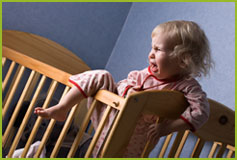How to help your baby fall asleep?

Help your baby fall asleep
A trouble-free evening falling asleep. Some parents may doubt, that it is even possible. However, there are some simple ways, thanks to which the child will calm down and prepare for bed, and thus tired parents will be able to spend some time together and, most importantly, get some sleep.
Evening ritual
Children are different, however, they all require an adequate amount and quality of rest at night. Therefore, you should help your toddler fall asleep, by introducing ongoing activities to prepare for this daily process. In this way, we will teach the child to sleep hygiene. Where to start? Preferably by specifying a fixed time, what time we start to silence the baby and prepare him for sleep. Let's turn off the tv, radio, let's dim the bedroom, let's take care of the silence in the house. It is very important that this ritual is constant and repeatable every day. After sedation, after bathing and feeding, put the baby to bed. We can turn on a relaxing lullaby CD. Quiet and calm music, supported by the mother's heartbeat will let the baby fall asleep. Thus, it will be easier for us to fight the so-called. fear of breaking up. Kids, who spend all day with an adult – we have, grandparents or nanny, they are afraid to be left alone in the room for the night. So it's a good idea to turn on prenatal lullaby music before you go to sleep, where you can hear the rush of amniotic fluid and the beating of the heart. Thanks to such music, the child will feel safe subconsciously and fall asleep easier. As a child grows, problems change, which interfere with falling asleep. However, "Prenatal Lullabies", due to their unique properties based on scientific research, are an excellent remedy for sleep problems in children of all ages.
Ways to sleep with "Prenatal Lullabies" in the background, when the child has ...
1 month – A newborn baby should be put to sleep in a not very spacious and bright room. Until now, the baby was used to the tightness of his mother's belly, therefore you will feel better in a basket lined with dark fabric and with the sounds of a lullaby with a heartbeat.
2-3 months – During this period, colic appears in children, which additionally hinder falling asleep. Therefore, it is advisable to limit the number of stimuli: visits, travel, learning new things. Before going to bed, it is good to massage the baby's tummy with olive oil and put it on the tummy for a few minutes. It's also worth taking care of your own emotional balance, because children can easily sense their parents' nervousness and stress, and thus they themselves become restless. Many parents use a blow dryer or a fan to calm their toddler, because the uniform noise has a calming effect. However, it is not possible to leave a turned on object in the child's room and exit, because it is very dangerous and could end tragically. Therefore, a safer way will be to include "Prenatal Lullabies" with rhythmic music supported by the noise of the prenatal environment.
4-6 months – An infant may suffer from growing teeth, then he often wakes up crying at night, it is restless. A good way is to lubricate the child's gums with a teething gel and play music from the album "Prenatal Lullabies" for the whole night..
7-8 months – The child is already getting the evening meal of porridge, which allows him to sleep longer. Most often, mums return to work, and the nightly whining of the baby is caused by the longing for the mother. Because, in order to avoid the child constantly waking up and calling the mother, it is worth turning on the relaxing CD with a beating of the heart and first 10 minutes to listen to it with your baby, and when he falls asleep, but not asleep yet – leave the comfort room, so, so that she can fall asleep on her own.
9-12 months – Your baby may wake up at different times, call your parents and encourage them to play. That is why "Prenatal Lullabies" will be perfect here., because monotonous activities – reading a book and listening to quiet music – it will put the child to sleep quickly.
Basic principles of children's sleep hygiene:
|